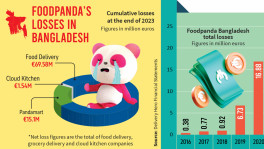Europe’s new defining moment
The COVID-19 pandemic represents a major opportunity for the European Union and the eurozone to act decisively on a common problem, thereby strengthening the bloc's solidarity and integration. So far, however, European leaders have failed to seize it.

The European Union and the eurozone are approaching their second defining moment in a decade. The first was the debt crisis that started in 2010 and was quelled by European Central Bank President Mario Draghi's July 2012 pledge that the ECB was ready to do "whatever it takes" to preserve the euro. The ECB backed up Draghi's declaration by introducing the outright monetary transactions (OMT) scheme, an emergency sovereign-bond-purchasing program that fortunately never had to be used.
The EU then established a banking union, with the ECB assuming the role of bank supervisor and a common resolution mechanism dealing with failing institutions. But this union is still incomplete, because the resolution backstop is insufficient for a major crisis and there is no common deposit-insurance scheme.
More generally, as a monetary union that lacks a fiscal union to share risks, the eurozone is an unstable creature. And COVID-19 represents a major shock that calls for huge expenditures – not only on health care, but also to keep the European economy on life support while lockdowns and social-distancing measures are in effect.
Only the public sector can cope with such a challenge. Unfortunately, however, the EU is once again divided between fiscally strong northern member states, led by Germany and the Netherlands, which have debt-to-GDP ratios around 60%, and fiscally weak countries where this ratio is close to or above 100%. Indeed, nine EU countries, led by France, Italy, and Spain, have proposed mutualized "coronabonds" to help mitigate the pandemic's economic impact. (Portugal, Ireland, Luxembourg, Slovenia, Belgium, and Greece also support the idea.)
But the fiscally strong member states, fearing moral hazard, oppose debt mutualization. Although a symmetric macroeconomic shock like the one the eurozone currently is experiencing weakens the moral-hazard argument, northern countries' fear is not without merit. After all, most of the countries supporting coronabonds have failed to put their fiscal house in order since the euro debt crisis ended.
Moreover, there are several practical problems with coronabonds, not least the need for guarantees or direct transfers from national budgets, owing to the absence of any European revenues to back such instruments. Germany insists that established EU rescue funds such as the European Stability Mechanism (ESM) be used first. As far as the frugal member states are concerned, now is not the time to establish a eurozone safe asset.
Nonetheless, an EU program to combat COVID-19 would also help the bloc's northern members to control the epidemic and limit the damage to their own economies. Without such a scheme, countries like Italy or Spain would be bound to spend too little on tackling the public-health emergency and promoting economic recovery, implying negative effects on public health and economic performance not only in those countries, but also in northern Europe.
Since the European Council's inconclusive March 26 virtual summit, there has been a range of EU initiatives, including the relaxation of state-aid rules to help troubled firms and, most recently, a €540 billion ($590 billion) spending package to support member states' economies. The package, proposed by Eurogroup President Mário Centeno, includes up to €240 billion in credit from the ESM, up to €200 billion in loans for small- and medium-size enterprises from the European Investment Bank, and a €100 billion loan plan for unemployment benefits from the European Commission.
Although applying to the ESM is a precondition for the ECB to intervene with the OMT scheme, it carries a stigma and usually comes with conditions. Financing for COVID-19-related expenses, by contrast, will come with no strings attached, though other economic support would carry conditions. Furthermore, EU finance ministers have agreed to establish a temporary recovery fund, which may be financed by "innovative financial instruments." The battle for partial debt mutualization, pushed by France, has been postponed.
Although these measures go in the right direction – indeed, they have saved the day – the question is whether they will be enough. If not, then the eurozone – and the EU as a whole – will have failed to act decisively on a common problem, and the split between blocs of member states will persist and possibly deepen.
One could argue that the ECB can fix any problem regarding fiscally weak countries' sovereign debt by again pledging to do whatever it takes. But Draghi was lucky in that the OMT was never invoked, and it is unclear whether those magic words will work this time.
Indeed, if the crisis persists and the public debt of Italy and Spain increases substantially (to, say, 160% and 130% of GDP, respectively), then the markets may test the ECB's resolve to keep buying these countries' sovereign debt. The ECB may therefore have to go far beyond its benchmark capital allocation among countries when implementing its recently announced €750 billion asset-purchase program (which remains smaller than Italy and Spain's estimated debt for 2020). True, the ECB's action will buy time and give affected countries more fiscal leeway, but, as in the debt crisis, the ECB will remain exposed as long as the eurozone lacks a common fiscal policy.
Once again, the eurozone has responded with more integration only when on the brink of disaster. Let us hope that we are also lucky this time, and that no accident materializes to call the euro's future into question while Europe muddles through the crisis.
Xavier Vives is Professor of Economics and Finance at IESE Business School and the author of Competition and Stability in Banking.
Disclaimer: This article first appeared on project-syndicate.org, and is published by special syndication arrangement.


 Keep updated, follow The Business Standard's Google news channel
Keep updated, follow The Business Standard's Google news channel
















